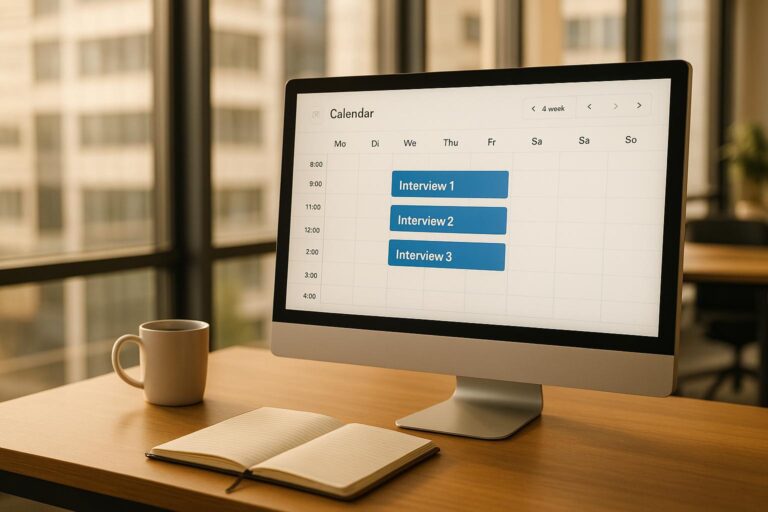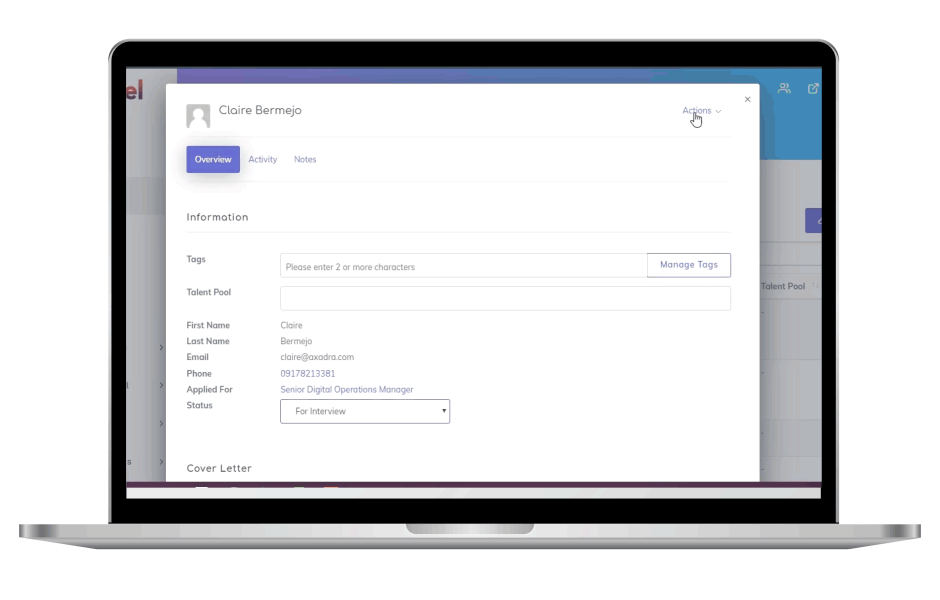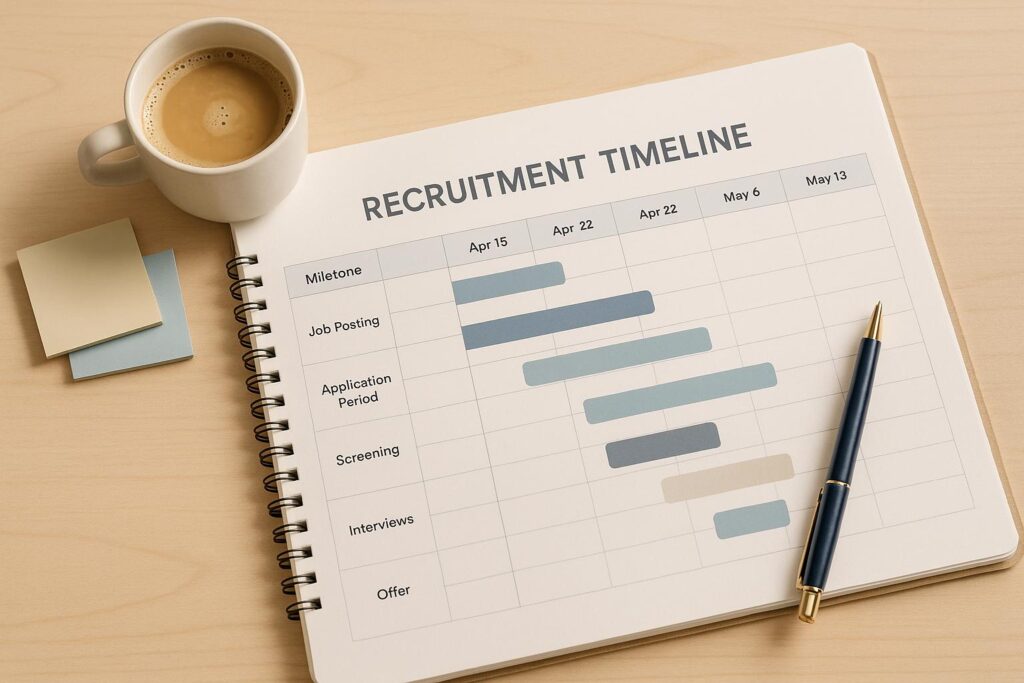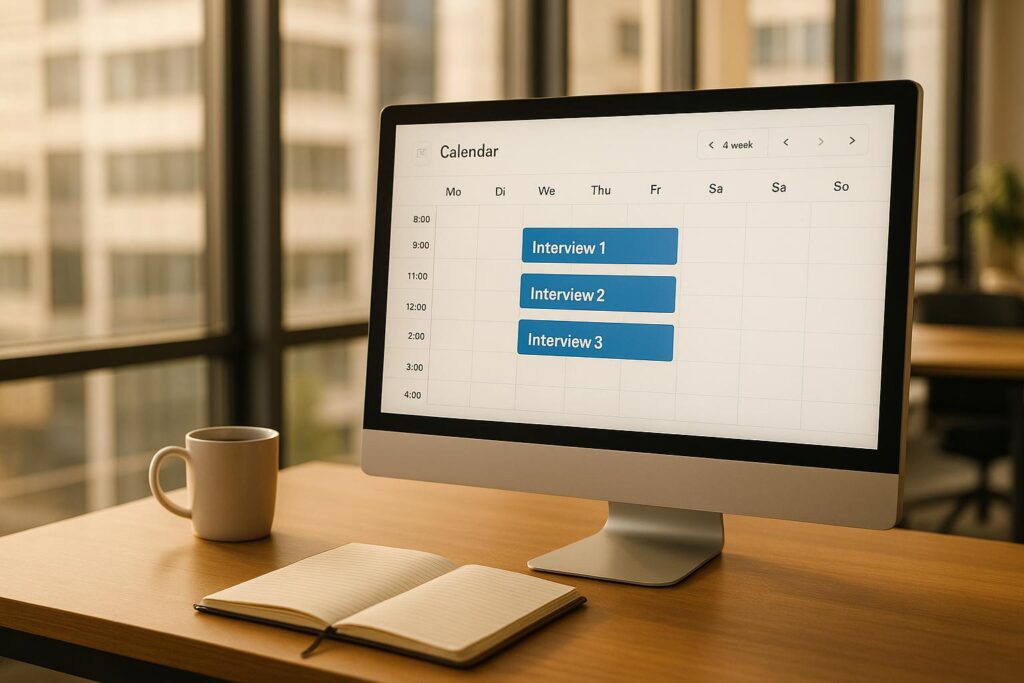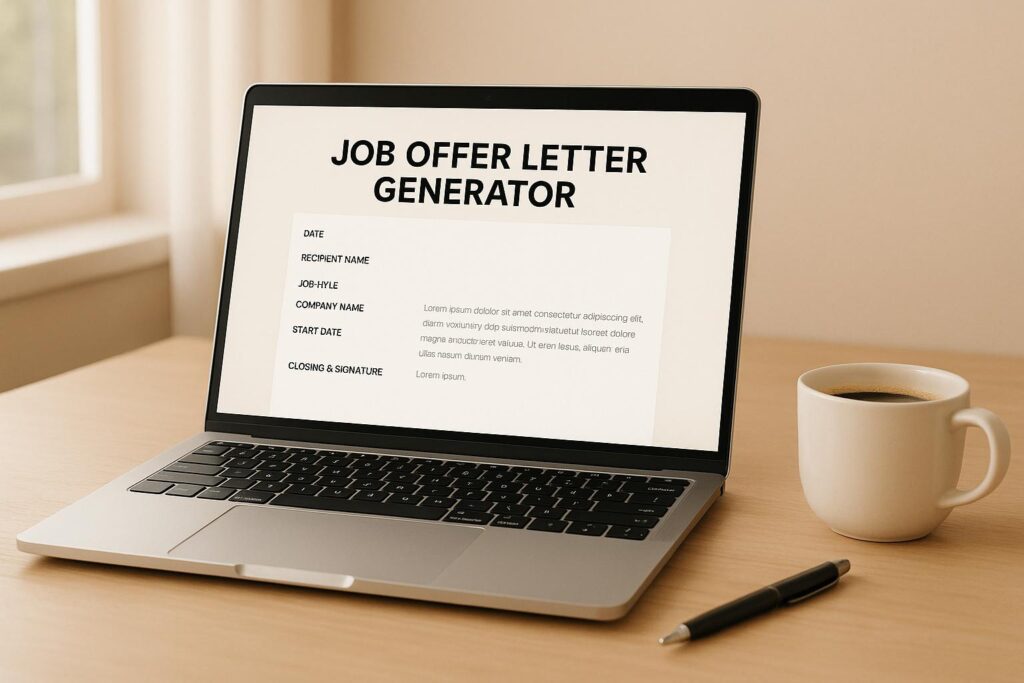Interview scheduling software has transformed how hiring teams manage interviews, saving time and improving efficiency. These tools reduce manual scheduling by up to 70%, cut time-to-hire by 20-30%, and decrease no-show rates by 50%. Key features include calendar integration, self-scheduling, automated reminders, and applicant tracking system (ATS) integration. Advanced tools also offer multi-time zone support, AI-driven scheduling, and video conferencing.
Key Features:
- Calendar Integration: Syncs with Google Calendar, Outlook, and more for real-time availability.
- Candidate Self-Scheduling: Lets applicants book interviews directly, reducing back-and-forth communication.
- Automated Communication: Sends reminders and updates via email/SMS to minimize no-shows.
- Panel Interview Coordination: Simplifies group interview scheduling and avoids conflicts.
- ATS Integration: Centralizes candidate data and updates automatically.
- Analytics Dashboards: Provides insights into scheduling efficiency and interviewer performance.
- Advanced Tools: AI recommendations, multi-time zone support, and video conferencing.
Why It Matters:
These tools streamline the hiring process, making it faster and more convenient for both recruiters and candidates. Platforms like Skillfuel stand out by combining scheduling, tracking, and analytics into one system, tailored for U.S. hiring needs.
How to use Calendly for Recruiting & Interview Scheduling: Top 5 Features
1. Calendar Integration and Real-Time Availability
Calendar integration works seamlessly with major platforms like Google Calendar, Microsoft Outlook, and Apple Calendar, giving hiring teams the ability to view real-time availability and prevent scheduling conflicts.
For example, if a meeting is already set for 2:00–3:00 PM on a Tuesday, that time slot is automatically marked as unavailable for candidates. Thanks to real-time syncing, any meeting booked or blocked updates across all connected calendars instantly. The system also supports single-use booking links, which deactivate once a slot is reserved.
Without this kind of integration, scheduling often requires tedious manual checks and back-and-forth emails, which can lead to double-bookings. In fact, a report highlights that integrating calendars and automating scheduling can cut the time it takes to set up interviews by over 70% compared to manual methods.
Another helpful feature is multi-calendar overlays, which display availability across multiple team members. This is especially useful for coordinating panel interviews or matching schedules with hiring managers from different departments. The software quickly identifies shared open slots, ensuring no overlaps. This multi-calendar view also integrates protections to avoid double-booking.
The impact on hiring efficiency is undeniable. Companies using automated scheduling tools have reported tripling their interview volume without adding more recruiting staff, according to customer feedback.
Skillfuel takes this a step further by integrating directly with U.S. calendar systems, streamlining scheduling while preserving existing workflows. It even adjusts for time zones, displaying availability in candidates’ local times automatically.
For businesses hiring across multiple states or managing remote positions, this feature is a game-changer. It minimizes confusion, prevents scheduling errors, and ensures appointments run smoothly.
2. Candidate Self-Scheduling
Candidate self-scheduling takes the convenience of calendar integration a step further by letting applicants book their own interview times – no endless email exchanges required. Instead of waiting for back-and-forth communication, candidates simply receive a booking link, choose a time that works for them, and get an instant confirmation.
Recruiters can set their availability in advance, and once a candidate selects a slot, the system automatically confirms the appointment. This not only saves recruiters hours each week but also cuts scheduling delays by up to 30%. For candidates, it means quicker confirmations, more flexibility, and less stress leading up to the interview. It’s a win-win for everyone involved, making the entire process smoother and faster.
Features like personalized booking pages and built-in video conferencing add another layer of convenience. This is especially helpful for high-volume hiring or roles with multiple interview rounds, where coordinating schedules manually can be a major headache.
Skillfuel incorporates this self-scheduling feature into its recruitment management tools, allowing candidates to book interviews effortlessly. By pairing this with automated reminders and applicant tracking, Skillfuel helps companies significantly reduce manual scheduling tasks while improving the overall experience for candidates.
To make things even easier, real-time calendar integration and automatic time zone detection ensure seamless scheduling for companies with remote teams or operations across multiple states. This functionality is particularly beneficial for U.S.-based businesses managing nationwide recruitment.
3. Automated Communication and Reminders
Automated communication takes the hassle out of interview scheduling, turning it into a hands-off, efficient process. Instead of juggling confirmation emails, rescheduling updates, and follow-up messages manually, the software manages all these tasks for you. The result? Everyone stays informed, and your team saves time and effort.
Once an interview is scheduled, clear communication becomes key. Confirmation messages are sent immediately, providing candidates with all the essential details: date (formatted as MM/DD/YYYY, 12-hour clock), location or video link, interviewer names, and any preparation instructions. This instant confirmation minimizes confusion and helps candidates feel prepared right from the start.
If rescheduling becomes necessary, rescheduling notifications automatically update everyone involved. Candidates, interviewers, and panel members receive the revised details, ensuring no one misses the latest schedule. This automation avoids the all-too-common scenario of someone showing up at the wrong time due to a missed email.
Follow-up communications – like thank-you notes, feedback requests, or next-step instructions – are also automated. These messages keep candidates engaged and provide a sense of closure. For recruiters, it eliminates the need to remember every follow-up task, ensuring consistent communication throughout the process.
The benefits of automated reminders are clear. Industry data shows they can cut interview no-show rates by up to 50%. Companies using these systems report up to 70% faster coordination and a 30-50% reduction in scheduling errors. This means smoother hiring cycles and better use of HR resources.
To ensure messages are seen, multi-channel delivery uses both email and SMS. Since many professionals check text messages more frequently than email, having both options increases the likelihood that your scheduling updates will be noticed. This approach reinforces the seamless experience provided by the platform.
You can also customize automated messages to align with your company’s voice. Adjust reminder timing – such as sending alerts 24 hours and 1 hour before interviews – or tweak message content to match your professional tone. Personalization like this makes communications more effective while maintaining consistency across all candidate interactions.
Skillfuel integrates these automated communication tools into its recruitment management platform. It handles confirmations, rescheduling updates, and follow-ups automatically, while keeping a detailed record of every interaction for tracking and compliance. With its centralized dashboards and applicant tracking capabilities, all communication history stays organized in one place, making the hiring process both efficient and cohesive.
4. Panel Interview Coordination
Panel interviews, where multiple stakeholders assess candidates together, can be a logistical challenge. Thankfully, modern interview scheduling software simplifies this process, making coordination smoother and more efficient.
By leveraging calendar integrations, the software scans all participants’ schedules to pinpoint overlapping availability. It identifies mutual free time slots and presents them as options, cutting out guesswork and speeding up the scheduling process.
Advanced algorithms take this a step further by factoring in interviewer workloads and time zone differences. For teams spread across various locations, the system finds time slots that work for everyone while balancing assignments to avoid overloading any one team member.
The software also handles multi-stage interview workflows seamlessly. For instance, after a candidate completes a first-round interview, the system can automatically schedule the next stage based on preset criteria. This ensures candidates move through the hiring process without unnecessary delays.
To prevent burnout, the software uses load balancing to distribute interviews evenly among team members. If someone’s schedule becomes too packed, the system suggests alternatives, ensuring fairness while maintaining the quality of evaluations.
When unexpected changes arise – like a panel member becoming unavailable – the software takes care of rescheduling. It suggests backup interviewers or proposes new time slots that work for the remaining participants. Updated calendar invites and notifications are sent automatically, keeping everyone in the loop.
A centralized dashboard provides recruiters with a clear view of the entire interview pipeline. From tracking scheduled interviews to spotting potential conflicts, this tool makes it easier to address bottlenecks and adjust schedules proactively. This streamlined visibility enhances the efficiency of the hiring process.
Skillfuel takes these features to the next level. Its automated workflow system eliminates manual tasks that often slow down complex interview coordination. For organizations managing high-volume hiring, Skillfuel’s bulk scheduling functionality is a game-changer. Instead of scheduling each interview individually, recruiters can set up entire interview loops in advance. The software then handles the coordination of participants and time slots automatically.
Integration with your existing applicant tracking system ensures a seamless flow of information. Panel members can directly access candidate details and evaluation forms, making it easier to provide feedback and support better hiring decisions.
sbb-itb-e5b9d13
5. Integration with Applicant Tracking Systems (ATS)
After streamlining interview coordination, connecting your scheduling software with an Applicant Tracking System (ATS) takes recruitment efficiency to the next level. This integration merges interview scheduling and ATS functionality, eliminating the fragmented systems that often slow down hiring.
When your scheduling tool links with an ATS, candidate data flows seamlessly between the two. Updates to interview schedules and changes sync automatically, which means no more copying and pasting details or juggling multiple platforms to keep everything up-to-date.
In fact, companies using integrated scheduling and ATS solutions have reported up to a 30% reduction in time-to-hire, thanks to automation and fewer manual tasks. By cutting down on platform-switching, recruiters can focus on engaging with candidates rather than wrestling with logistics.
Centralized data management is a game-changer for hiring teams. With all candidate details, interview notes, and scheduling updates in one place, recruiters get a clear overview. They can quickly identify which candidates have completed interviews, who’s pending, and where delays might be happening.
This seamless data exchange is made possible through API integrations or pre-built connectors. Popular scheduling platforms often come with ready-to-go integrations for ATS systems like Greenhouse, iCIMS, and Lever. These tools handle the technical complexities in the background, so your team can focus on hiring instead of troubleshooting.
When systems work together, workflows become smoother. For example, candidates can be automatically updated from "scheduled" to "interviewed" without manual input. Feedback from interviews is linked directly to the candidate’s profile, and hiring managers can access evaluation forms through the ATS without extra steps.
According to a 2024 G2 survey, over 70% of organizations now see ATS integration as a critical feature when choosing interview scheduling software.
This growing preference makes sense – integrated systems save significant time and reduce the burden of repetitive administrative tasks.
Another benefit of integration is automatic logging of interactions. Every candidate interaction and interview result is recorded, ensuring compliance with Equal Employment Opportunity (EEO) reporting and simplifying the documentation process. This centralized record-keeping minimizes the risk of missing key information or inconsistent records.
Take Skillfuel, for example. This platform combines ATS functionality and interview scheduling into a single system. Instead of forcing users to connect separate tools, Skillfuel offers an all-in-one solution. From managing applications to coordinating interviews, everything happens in one dashboard. Features like self-scheduling and automated reminders – mentioned earlier – are seamlessly integrated, ensuring a smooth workflow without the hassle of connecting disparate tools.
Candidates also benefit from this streamlined system. Automated reminders and confirmations are sent based on real-time updates, reducing communication delays. If a candidate needs to reschedule, the system updates both the scheduling tool and the ATS simultaneously, ensuring no details are overlooked.
For organizations exploring their options, it’s wise to prioritize platforms with native or API-based integration capabilities. These ensure real-time synchronization and adaptability to your specific recruitment needs. Skillfuel’s integrated approach supports the entire hiring process, from application to decision-making, creating a seamless experience for both recruiters and candidates alike.
6. Analytics and Reporting Dashboards
Making smarter recruitment decisions starts with knowing exactly what’s happening in your interview process. Analytics and reporting dashboards turn raw data into meaningful insights, helping you streamline workflows and tackle bottlenecks. This solid data foundation also paves the way for more advanced analytics to refine your hiring strategies.
Modern platforms track key metrics like interviewer participation, candidate feedback, and workload distribution to ensure interviews are evenly spread across team members. This not only prevents interviewer burnout but also maintains a consistent experience for candidates throughout your organization.
With the right analytics, recruiters can uncover patterns that might go unnoticed with manual tracking. For instance, visual workflow tools, like Kanban-style dashboards, provide a clear view of where candidates are in the process. These tools highlight problem areas, such as frequent rescheduling, delays in specific stages, or no-show patterns with particular interviewers. By pinpointing these issues, you can make targeted adjustments to improve efficiency.
Skillfuel’s centralized dashboard is a great example of how this works. Instead of juggling data from different tools, everything – like application tracking and interview completion rates – comes together in one place. Its visual workflow system quickly identifies productivity bottlenecks, speeding up the hiring process and improving overall efficiency.
Advanced dashboards also reveal actionable insights. For example, they can show which time slots are most often rescheduled, which departments face the longest delays, or which interviewers consistently receive top feedback from candidates. With this information, you can reassign interviewers, adjust scheduling windows, or make other strategic tweaks to improve the process.
AI-driven analytics take it a step further by predicting optimal interview times, forecasting candidate availability, and suggesting interviewer assignments based on past data. These predictive tools help reduce scheduling conflicts and improve the overall success rate of interviews.
Another advantage is the seamless integration with ATS and HR systems. When scheduling data flows directly into these systems, you can link interview metrics to broader outcomes like quality of hire and retention rates. This end-to-end visibility enables more informed talent acquisition decisions, going beyond just improving scheduling efficiency.
Reporting features are also highly customizable. Dashboards often allow users to filter data by date, department, interviewer, or role, and many platforms offer automated report generation for regular updates. These visualizations make it easier to share insights across teams and track performance over time.
Analytics dashboards also play a critical role in supporting diversity, equity, and inclusion (DEI) goals. They help organizations monitor metrics like candidate pool diversity, interviewer diversity, and potential biases in scheduling. These insights ensure a fair and inclusive hiring process.
7. Advanced Features: AI Recommendations, Multi-Time Zone Support, and Video Interview Integration
Modern interview scheduling software has evolved far beyond just syncing calendars. Advanced tools like AI-driven recommendations, multi-time zone compatibility, and integrated video conferencing are reshaping how companies manage hiring, especially for remote and international roles.
AI-powered scheduling recommendations take the guesswork out of finding the best interview times. By analyzing factors like availability, candidate preferences, and historical scheduling data, these tools suggest the most convenient slots. The results are impressive: companies can triple the number of interviews conducted while reducing manual scheduling efforts by over 70%. For instance, if candidates often reschedule morning interviews, the system might prioritize afternoon slots in the future. This predictive capability not only speeds things up but also ensures a smoother experience for candidates.
Multi-time zone support is a game-changer for global hiring. As more U.S. companies bring on international talent, scheduling solutions now automatically adjust to display time slots in participants’ local zones. This eliminates confusion and ensures everyone is on the same page. Imagine coordinating an interview between a candidate in India and a hiring team in California – these tools seamlessly suggest times that work for both parties, avoiding the hassle of manual time zone calculations.
Integrated video conferencing simplifies the process even further. By linking directly with platforms like Zoom, Google Meet, or Microsoft Teams, recruiters can schedule and launch video calls with a single click. Candidates receive one consolidated link containing all the interview details, reducing the risk of technical hiccups.
For example, a recruiter could use AI to pinpoint the best interview times across multiple time zones and automatically generate video meeting links for participants. Platforms like Skillfuel combine these advanced features – AI recommendations, multi-time zone support, and video conferencing – into a single, intuitive interface. This eliminates tedious manual tasks and aligns with the growing demand for efficiency in remote and international hiring.
Companies such as Pfizer and Nestlé have embraced these advanced scheduling solutions, reaping the rewards of AI-driven coordination tailored to global teams. These tools not only accelerate hiring timelines but also enhance the candidate experience, making them a vital part of modern recruitment strategies.
Comparison Table
The table below provides a side-by-side look at the features offered by popular interview scheduling software. It highlights the tools’ capabilities and showcases how Skillfuel delivers a robust set of features to simplify recruitment.
| Feature | Calendly | YouCanBookMe | Doodle | Skillfuel | HireVue | GoodTime |
|---|---|---|---|---|---|---|
| Calendar Integration | ✔ | ✔ | ✔ | ✔ | ✔ | ✔ |
| Candidate Self-Scheduling | ✔ | ✔ | ✔ | ✔ | ✔ | ✔ |
| Automated Reminders | ✔ | ✔ | ✔ (paid) | ✔ | ✔ | ✔ |
| Panel Interview Coordination | ✖ | ✔ | ✔ | ✔ | ✔ | ✔ |
| ATS Integration | ✖ | Limited | Limited | ✔ | ✔ | ✔ |
| Analytics & Reporting | ✖ | Limited | ✔ (Team plan) | ✔ | ✔ | ✔ |
| AI Recommendations | ✖ | ✖ | ✖ | ✖ | ✔ | Partial |
| Multi-Time Zone Support | ✔ | ✔ | ✔ | ✔ | ✔ | ✔ |
| Video Interview Integration | ✖ | ✔ | ✔ (paid) | ✖ | ✔ | Partial |
| Custom Branding | ✖ | ✔ (paid) | ✔ (paid) | ✔ | ✔ | ✔ |
| Free Plan Available | ✔ | ✔ | ✔ | ✔ | ✖ | ✖ |
| Starting Price (USD/month) | $8.00 | $8.10 | $6.95/user | Free | $35.00 | $49.00 |
Key Benefits for Recruiters
• Calendar Integration: Syncs all calendars in real-time to eliminate scheduling conflicts and ensure smooth coordination.
• Candidate Self-Scheduling: Allows candidates to choose their preferred time slots, making the scheduling process faster and more convenient.
• Automated Communication and Reminders: Sends email and SMS notifications to reduce no-shows and keep everyone on the same page.
• Panel Interview Coordination: Streamlines the process of scheduling group interviews by integrating workflows and enabling group polls.
• ATS Integration: Skillfuel excels here by centralizing candidate data and making it easier to track feedback and progress.
• Analytics & Reporting: Offers insights into scheduling efficiency and candidate engagement, helping recruiters make informed decisions.
This comparison shows a clear distinction between basic scheduling tools and platforms with advanced features. While simpler tools are suitable for straightforward scheduling, platforms like Skillfuel stand out with their free plan, ATS integration, and reporting tools – making them ideal for companies aiming to simplify and optimize hiring.
For U.S.-based recruiters managing remote teams, multi-time zone support is a must. Today’s scheduling tools automatically adjust appointment times to local time zones using the familiar 12-hour AM/PM format. Choosing software that aligns with your hiring needs can make all the difference in streamlining your recruitment process.
Conclusion
The features discussed earlier lay the groundwork for a more efficient hiring process. Tools like calendar integration, candidate self-scheduling, automated reminders, and ATS connectivity tackle the challenges of managing high-volume hiring across multiple time zones and diverse candidate pools.
Automated interview scheduling has proven to be a game-changer, cutting time-to-hire by up to 50% and reducing candidate no-show rates by 30%. Some organizations have even managed to triple their interview volume without increasing recruiter headcount, showcasing how scalable software can provide a powerful competitive edge.
Skillfuel stands out as a recruitment platform that redefines hiring efficiency. By combining interview scheduling, applicant tracking, automated communication, and centralized dashboards, it covers every aspect of the recruitment process. Features like customizable career pages and social media recruitment integration are especially helpful for U.S. employers aiming to attract diverse talent while adhering to EEOC guidelines and local labor regulations.
Automation, self-service tools, and data-driven hiring are no longer optional – they’re essential for businesses navigating distributed teams and remote workforces. Multi-time zone support ensures interviews are scheduled conveniently, and analytics dashboards offer actionable insights to fine-tune recruitment strategies. When integrated into a single platform, these tools enable smarter, faster hiring decisions.
Investing in advanced interview scheduling software like Skillfuel not only simplifies recruitment but also reduces costs, enhances the candidate experience, and supports data-driven decision-making. By cutting manual scheduling time by up to 70%, HR teams can focus their efforts on securing the best talent.
FAQs
How can interview scheduling software help minimize no-shows for interviews?
Interview scheduling software plays a key role in cutting down no-show rates by simplifying the process and keeping candidates informed. With features like automated email and SMS reminders, candidates receive timely notifications – both ahead of time and closer to the interview – minimizing the risk of them forgetting.
On top of that, candidate self-scheduling lets applicants pick a time that fits their availability, making it easier for them to stick to their commitment. By combining seamless communication with added convenience, these tools not only boost attendance rates but also save hiring teams a lot of time and effort.
How does integrating interview scheduling software with an Applicant Tracking System (ATS) improve the hiring process?
Integrating interview scheduling software with an Applicant Tracking System (ATS) makes hiring smoother by bringing all recruitment tasks into one place. This setup lets you track, rank, and manage candidates without constantly jumping between different tools.
With Skillfuel’s ATS, you can automate interview scheduling, cutting down on repetitive tasks and simplifying the process for both recruiters and candidates. By centralizing data and streamlining workflows, it helps save time, boosts efficiency, and keeps the hiring process well-organized.
How can AI-powered scheduling enhance interview coordination for global hiring?
AI-powered scheduling takes the hassle out of organizing interviews, especially for global hiring teams. By automatically factoring in time zones, holidays, and candidate availability, it eliminates the need for endless back-and-forth emails and ensures smooth coordination.
These tools also sync effortlessly with calendars, send out automated reminders, and even let candidates book their interviews themselves. The result? Less time wasted, fewer scheduling mistakes, and a better experience for candidates. Plus, recruiters can spend more time building meaningful connections with top talent instead of juggling logistics.

